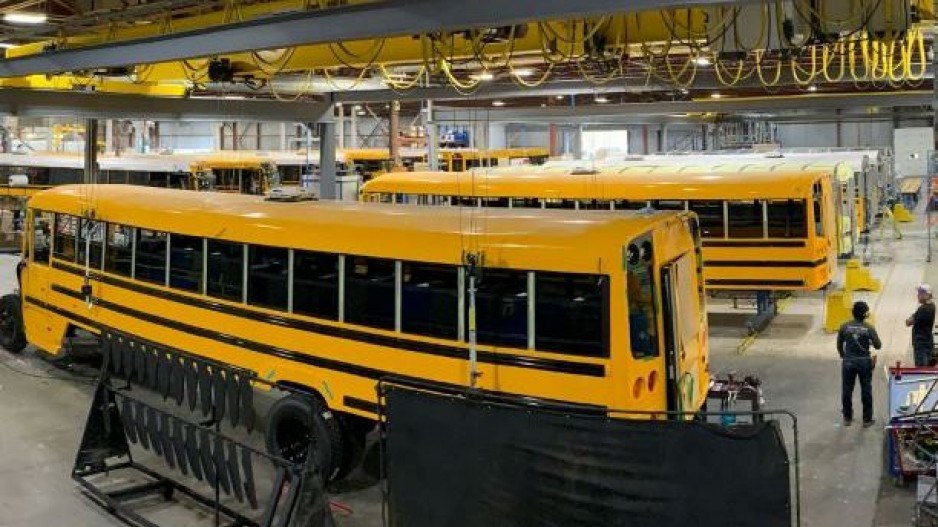Back in May, the Canadian Association of Oilwell Drilling Contractors announced they were dropping “oil” from their name to become the Canadian Association of Energy Contractors.
The name change reflects the transition taking place in energy in Canada and elsewhere. Those oil well contractors still drill oil wells, but increasingly they also drill natural gas wells and even wells for geothermal energy.
Clean energy and clean-tech already support 430,500 jobs in Canada, according to a new report, The New Reality, by Clean Energy Canada and Navius Research, which projects job growth in that sector to more than make up for job declines in the oil sector.
It projects job growth of 50% in clean energy and clean-tech -- to 639,200 -- by 2030, while fossil fuel industry jobs are expected to decline by 9%.
“In terms of raw numbers, those 208,700 new clean energy jobs far exceed the 125,800 lost in fossil fuels,” the report predicts.
"In terms of value, the whole of Canadian energy is on track to grow by 20% over the next decade, driven largely by huge gains in the Canadian clean energy sector’s GDP.
"By 2030, clean energy will make up 29% of Canada’s total energy GDP, up from 22% in 2020."
It’s worth noting that the report includes things like electric vehicles in its definition of clean energy. Asked if the report also included internal combusion enginee car manufacturing in its fossil fuel sector, Clean Energy Canada said it did.
Oil producers world-wide took a major hit during the pandemic, as demand for oil plunged. Oil producers cut production, there were massive layoffs in both Canada and the U.S. and investments in new wells and oil sands were reduced.
“While most energy sources struggled, renewable energy actually grew worldwide,” the report notes. “Not only was it the only energy sector to do so, but it grew at its fastest pace in almost two decades, according to the International Energy Agency.”
Alberta’s oil sector has been seeing declining investments since 2015, generally due to market forces and a lack of pipeline capacity. And now new climate change policies, both in Canada and abroad, are expected to add momentum to the industry's decline, and an increase in clean energy and clean-tech sectors.
“While the fossil fuel sector may be facing headwinds from changing global macroeconomics, the global clean energy sector’s strong tailwinds more than make up for it,” the New Reality report states.
“According to the International Energy Agency’s net-zero 2050 scenario, clean energy investments would create 30 million new jobs globally by 2030, offsetting the five million jobs that would be lost in the declining fossil fuel sector.”
By far, the largest growth in jobs will be in the clean transportation space.
“Jobs in electric vehicle technology are on track to grow 39% per year, with 184,000 people set to be employed in the industry in 2030—a 26-fold increase over 2020," the report estimates.
“With EVs set to make up 18% of all new passenger vehicle sales by 2030, more clean energy sector workers will be employed building, driving, and operating them.
“Another industry expected to take off is hydrogen consumption technology, with jobs expected to grow 27% per year between 2025 and 2030, employing an impressive 21,900 workers by 2030."
In Canada, key decarbonisation policies that will push energy transitions include a national carbon tax, scheduled to increase to $170 per tonne by 2030, a new national clean fuel standard, and the phasing out of coal power.
While domestic policies like the phase-out of coal will drive investments in renewables and nuclear power in Canada, policies elsewhere in the world are already driving the demand for Canadian made clean-tech products, like fuel cells, batteries and electric vehicles.
The report spotlights three Canadian clean-tech manufacturers that are already selling their products around the world: Lion Electric Co. (TSX:LEV)., based in Quebec, which makes electric buses and trucks, Ballard Power Systems (TSX:BLDP), the Vancouver hydrogen fuel cell pioneer, and Loop Energy (TSX:LPEN), another Vancouver company in the fuel cell space.
For Alberta, one new potential export industry that could help it cross the energy transition bridge is the production of hydrogen from natural gas, using carbon capture and storage.
“Another industry expected to take off is hydrogen consumption technology, with jobs expected to grow 27% per year between 2025 and 2030, employing an impressive 21,900 workers by 2030,” the report notes.
“Meanwhile, hydrogen production for transportation is set to grow even more quickly, with employment increasing 25% per year over the same period to just over 2,200 workers in a decade’s time.”
Other sectors expected to grow in Canada include waste-to-energy and technology for carbon capture and storage or use.
The report concludes with a recommendation that Canadian policy makers begin preparing now to help workers in the fossil fuel sector transition to other jobs.
“By 2030, Canada’s energy landscape will look a lot different,” the report predicts. “Preparing for the shift now helps ensure that workers facing job losses are able to smoothly transition into new fields, whether it’s the clean energy sector or other employment areas.
“But Canada is currently lacking a plan for transitioning and preparing its labour force for the growing opportunity.”
(This story has been updated to provide information on car manufacturing included in the report's assesements of the fossil fuel and clean energy sectors.)




